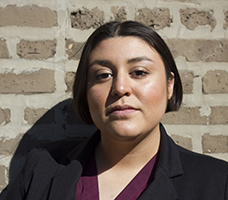
Why is spotlighting Minority Mental Health Month important? What are messages about mental health that are particularly needed for individuals in your community?
I have found that there is a lot of wonderful support for finding wellness in Hispanic communities, like being with family, having neighborhoods that feel like a community, taking time for yourself and your spirituality, and eating good foods, but I have also seen a reluctance to see a doctor or to take a medication for your mental health. Mental health is still seen as less important or less “real” compared to physical health. I think it has been very important in my mental health journey to be open with my family about seeing a therapist and the ways in which doing that has been a positive in my life.
How do you feel and see the interaction between you racial identity and your mental health condition interact? What unique or particular challenges, circumstances, or benefits have you experienced as a result?
One challenge that I face being a young queer woman of color is that oftentimes my concerns are not taken as seriously by medical professionals as they might be if someone else brought them up. I feel the need to explain or justify how I feel to doctors even when it seems like it would be their job to take me at my word when it comes to my experiences. This can be a serious barrier to finding and maintaining wellness physically and mentally.
What is your history and relationship with DBSA?
I have been on the staff of DBSA for a bit over two years.
What do you feel that you have gotten out of being part of the DBSA community?
Being a part of the DBSA community has validated my experiences of mental health and has provided a framework for me to seek wellness on my own terms without apology. My journey to mental wellness is not going to look like anyone else’s, and that’s okay! I now have a community of people who understand that message and are supportive of whatever decisions I decide to make.
What would you like to see, in the short- or long-term, change in the mental health space? What impact would you like to have?
I would like to see suicide and suicidal thoughts be taken more seriously. Oftentimes, someone talking about thoughts of suicide is derisively framed as “attention-seeking”, and that is very hard to hear. I think about it like a baby: a baby cries even if it’s not hungry or wet in order to be held. The baby is seeking attention because that is what it needs in order to feel safe and okay. Human beings are social creatures, and it seems cruel to me to view an adult in a negative way for attempting to be seen or heard and feeling the need to do so fiercely enough that their other option would be to choose to die. This cruelty often magnifies one’s feelings of worthlessness and hopelessness and can contribute to suicide attempts.


